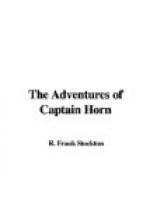It would be difficult—in fact, almost impossible—to land a cargo at the point near the caves where the captain and his party first ran their boats ashore, nor did the captain in the least desire to establish his depot at a point so dangerously near the golden object of his undertaking. But the little bay which had been the harbor of the Rackbirds exactly suited his purpose, and here it was that he intended to land his bags of guano. He had brought with him on the vessel suitable timber with which to build a small pier, and he carried also a lighter, or a big scow, in which the cargo would be conveyed from the anchored schooner to the pier.
It seemed quite evident that the captain intended to establish himself in a somewhat permanent manner as a trader in guano. He had a small tent and a good stock of provisions, and, from the way he went to work and set his men to work, it was easy to see that he had thoroughly planned and arranged all the details of his enterprise.
It was nearly dark when the schooner dropped her anchor, and early the next morning all available hands were set to work to build the pier, and, when it was finished, the landing of the cargo was immediately begun. Some of the sailors wandered about a little, when they had odd moments to spare, but they had seen such dreary coasts before, and would rather rest than ramble. But wherever they did happen to go, not one of them ever got away from the eye of Captain Horn.
The negroes evinced no desire to visit the cave, and Maka had been ordered by the captain to say nothing about it to the sailors. There was no difficulty in obeying this order, for these rough fellows, as much landsmen as mariners, had a great contempt for the black men, and had little to do with them. As Captain Horn informed Maka, he had heard from his friends, who had arrived in safety at Acapulco; therefore there was no need for wasting time in visiting their old habitation.
In that dry and rainless region a roof to cover the captain’s stock in trade was not necessary, and the bags were placed upon a level spot on the sands, in long double rows, each bag on end, gently leaning against its opposite neighbor, and between the double rows there was room to walk.
The Chilian captain was greatly pleased with this arrangement. “I see well,” said he, in bad Spanish, “that this business is not new to you. A ship’s crew can land and carry away these bags without tumbling over each other. It is a grand thing to have a storehouse with a floor as wide as many acres.”
A portion of the bags, however, were arranged in a different manner. They were placed in a circle two bags deep, inclosing a space about ten feet in diameter. This, Captain Horn explained, he intended as a sort of little fort, in which the man left in charge could defend himself and the property, in case marauders should land upon the coast.
“You don’t intend,” exclaimed the Chilian captain, “that you will leave a guard here! Nobody would have cause to come near the spot from either land or sea, and you might well leave your guano here for a year or more, and come back and find it.”




